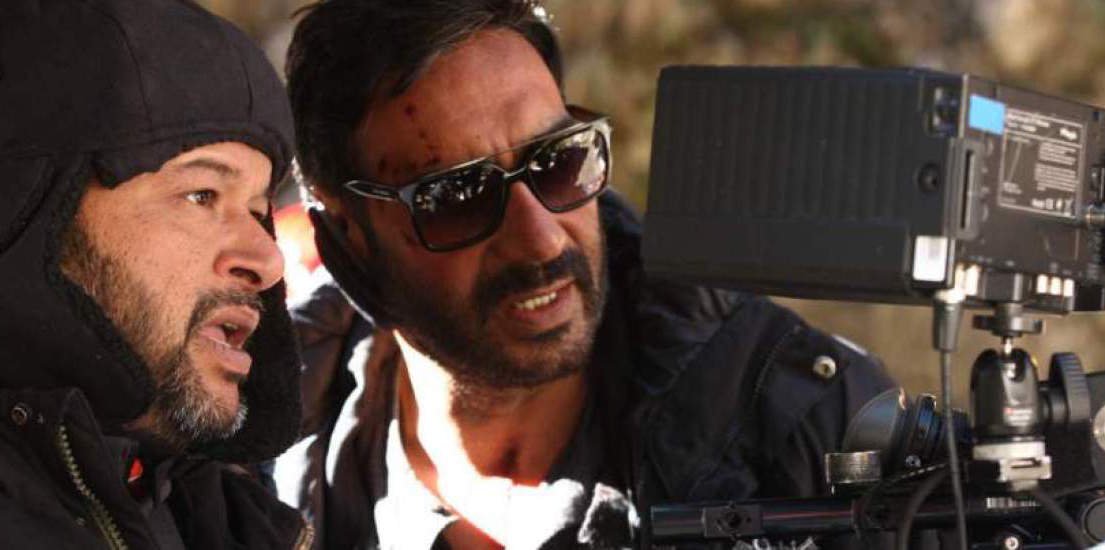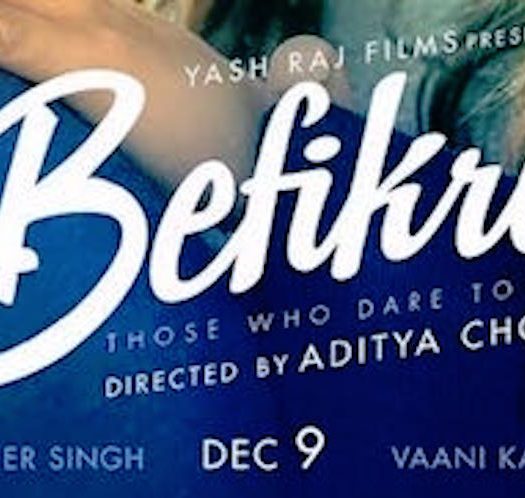As a cinematographer, you have to serve the story – Aseem Bajaj
Cinematographer Aseem Bajaj is a very ‘greedy’ man. In his career spanning over 24 years, he has been so smitten by the magic of films that he doesn’t want to limit his role as a cinematographer. The brilliant lensman has recently turned a producer in order to get involved in almost every process of filmmaking. In a heart – to – heart conversation, Bajaj who stunned everyone with his latest work in Shivaay, shares his style of working, lessons he learned as a producer and how he welcomed digital filmmaking.
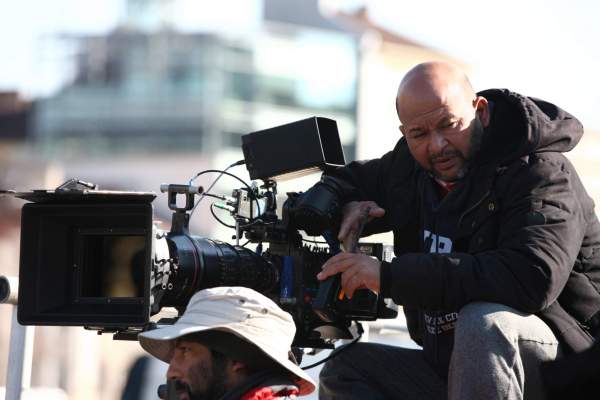
Cinematographer Aseem Bajaj
Shivaay happens to be one of your biggest films recently. How has the response been?
The overall response to the movie is something that everyone knows. There is nothing new in it. I was really appreciated by the director and that is what really matters. A lot of people have said many good things to me but that doesn’t really matter. Because when someone knows that you are the cinematographer of a particular film, nobody tells you that your work was bad. There are films where I was not really proud of my work but people praised even those. And at that moment you know that they don’t mean anything.
How do you actually find out which praise is genuine and which isn’t?
When somebody who doesn’t know you or has nothing to do with the movie still talks about your work, then he is genuine. And then you get to judge their sensibility, how sensible are they to judge your work.
READ: Action is in my blood: Ajay Devgn
Was there any compliment that really touched your heart?
When Ajay himself told me that my work was breathtaking, it was a compliment that really mattered, something that I hold close to my heart. My wife Leena (Yadav, director) has been a huge critic in my life. She is a writer, editor and director. So I take her compliment very seriously and she is very proud of my work in Shivaay. She is very particular about the visuals.
Raju Hirani told me that he felt cold while sitting inside the theatre by watching the colours that I created. He felt that he was actually in -30 degree weather while looking at the visuals. That was a beautiful compliment. I have heard other people also say that they actually felt the cold.
Cinematographer Russel Carpenter who shot Parched, the movie that I produced, also told me something. Everybody has seen at least one movie of his and that is Titanic. I sent him the trailer of Shivaay and when I later visited him in LA, he asked me how I did it. He was not someone who was trying to please me so that was a compliment that really mattered.
Shivaay was shot in a foreign land, what role does the location play in enhancing the cinematography?
It is very important. It doesn’t matter whether it is India or Europe – what matters is if it is the right location or not. If I need a shot of Chandni Chowk, I need to be shooting there. I cannot shoot in Ramoji Rao (studio) and put up a set and call it Chandni Chowk. It doesn’t lend the same feel. Locations do matter a lot.
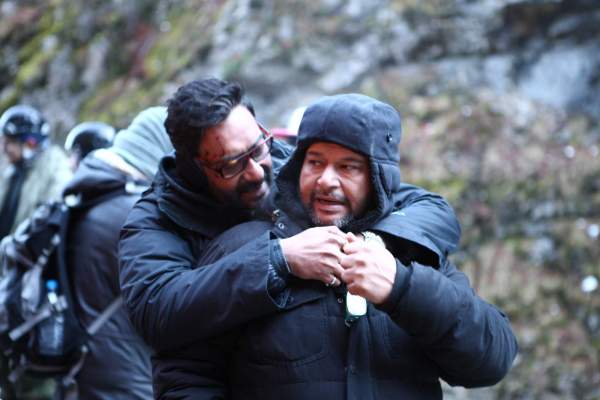
On the sets of Shivaay
What is your working relationship with Ajay Devgn (as director and actor) as you’ve done several films together?
He is extremely clear about his vision, what he wants and doesn’t want. That is a rare thing – a director knowing what he wants and doesn’t want – is a beautiful quality, which helped us a lot in delivering.
I share a beautiful relationship with him. None of us function from the place of ego and that makes this collaboration awesome. When you have to collaborate with someone just drop the ego. He is very open to ideas and so am I. I don’t mind anyone coming up to me and giving ideas. I believe that it doesn’t matter who is right but what is right.
When it comes to cinematography, what is it that has influenced your work?
If you ask me which is my favorite film from the cinematography point of view, I might not be able to answer it. Because for me, nothing works if a movie doesn’t work. Cinematography is a part of the film just like sound is.
Then what is it that matters to you in a film?
It is the script. Even the box office is very irrelevant to someone like me. Just because a film does not make numbers doesn’t make it a bad film. After being in the business for 24 years, that is probably why I went back into my shell because I didn’t want to do this. It is perhaps where I come from. I came from literature, drama, theatre. This (film industry) is just a rat race. If you run fast, you’ll be a super rat but you’ll still be a rat.
What is it that you want to do?
Something that makes sense. In fact, there is so much that I want to do in one life and why should I limit it to just being a cinematographer. I’m already producing movies. Being a producer allows me to be part of every department in some way. But being a cinematographer cuts you off from the entire world.
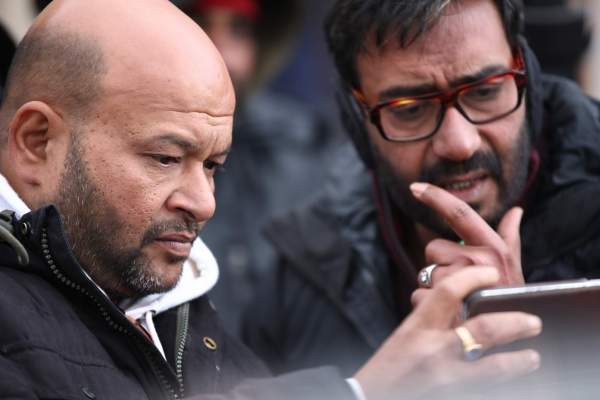
On the sets of Shivaay
So you basically want to have something of everything.
Yes. I’m a greedy man. Leena and I just eat, drink and crave for movies. Movies are everything for us. When I turned producer, I initially thought that it would be a cake walk. But it is really not. Being a producer doesn’t mean that you are the money bag because the money is not yours. There are investors who are putting in the money with the faith that you will be able to deliver. It just makes you so responsible. I started realizing things that I didn’t ever think of. I think thrice before I order anything now – even as a cinematographer.
READ: The stories in Parched finds resonance universally and eternally – Leena Yadav
Has your stint as producer made you wiser when it comes to spending money?
If you spend one rupee then you’ll have to do business of two rupees to break even. So if people are paying for what you have made, you have no right to take them for a ride.
Movies are not my business. They are my passion. Fortunately, it became my profession. When we are making movies, we are not really doing a job. It is like somehow who loves playing football and then becomes a great football player and is getting paid for playing the game. Photography was my passion and I became a cinematographer and people started paying me. I’m a photographer first. And was just doing photography as a hobby.
My journey into films started from being an extra in the movie Bandit Queen. Tigmanshu Dhulia who was the casting director for that film cast me as one of the bandits. I asked him if I could see how the movie was made. Somehow it worked and I was paid Rs. 3000 for three months. I was the happiest at the time.
When you watch a movie in theatres, it is so magical. That magical feeling has not gone away from me even today. I still find moving images very magical.
When it comes to cinematography, what is your style of approaching subjects?
It is never the style of cinematography. It is the overall style of the film. I would never go and see a film because of its cinematography alone. I would watch it for the kind of film it is. If I had to see only the camera work and visuals, I would rather pick up Raghu Rai’s book. The story has to make sense. And then as a cinematographer, you have to serve the story.
If as an audience, you tell me that the scene has such a beautiful camera angle – the light that is there on the left side is amazing; I would consider myself to be a failure as a cinematographer. Because that means I have overpowered the story and not served the script. The role of the cinematographer is to not get carried away. It is very subjective but that is not cinematography for me.
What are your reference points whenever you start working on any film?
Most of the times it is the script itself. Then we start looking at various movies which are in the same zone. One is always influenced by the visuals that one has seen in one’s life. You may have seen something 20-30 years back and may not remember where you saw it but it leaves a print in our brains. That is probably how I think it works. I don’t have a set formula for it. I don’t do hardcore referencing. I do not cram things also. I’m very organically instinctive in my decision.
READ: Light has a huge role to play in all my films- P. C. Sreeram
In general, what kind of lighting setup do you prefer?
I like natural lighting and exploit it as much as I can. I often try to avoid using artificial light.
What do you look for when hiring your main team – the gaffer, key grip, camera operator etc.
I simply choose people who will give me harmony. It is very important for me. I don’t like shouters and people who create any kind of disturbance in the harmony of things. It is important to keep laughing and growing. I don’t know what you must be dealing with in your life and vice-versa. But the least we can do is to be nice to each other.
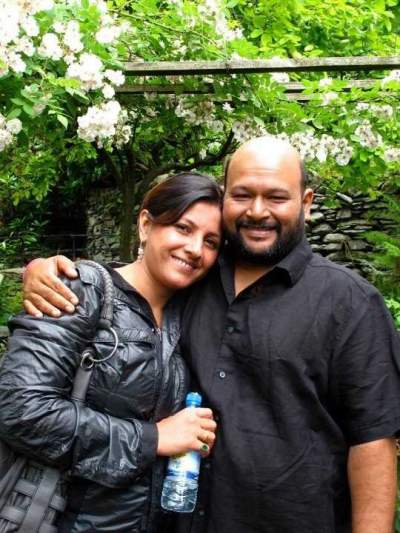
Aseem with his wife Leena (image courtesy: IMDB)
Your previous projects must be on film? How did work change when movies went from film to digital?
I had only shot on film earlier – be it Chameli, Teen Patti or U, Me aur Hum. But in the last two-three years, I have had no options. I welcomed digital when it happened. We started seeing better quality because there were no pin or dust holes. From the first scene to the last, it was the same. With digital, I would say that the process of making the movie became more democratic. Earlier the director would believe whatever the DOP would say about how a scene would look. But now he can actually see and has the option to say that he doesn’t want it in that particular way. I had my own 35mm camera and miss the nostalgia and smell of 35. But somehow I welcomed technology. There is no point being stuck to it. I love technology as it has made a lot of things possible. It is a giant leap which is happening every day and we have to welcome technology.
In today’s world and in the field of cinematography, how do you keep yourself updated?
By reading and staying in touch with youngsters who surprise me every day. It is important to keep reading about technology, photography and marvelous things happening around the world. If you get impressed by something then go and see how they did it.
You have also done short films, what is the general difference between working on a short in comparison to a regular narrative film?
I love the format of short films. I like working with new ideas and works. Also, I enjoy working with students because they don’t really care who you are. When they are directing for the first time, they are directing the biggest movie of the world. They are so demanding and keep challenging you. Whenever I get a student film, I quickly get on board. They may not be money making projects but you want to do it as that keeps you going. It is like oxygen.
READ: Guide to make your short on a shoe string budget
What is keeping you busy these days?
There is an American production called Spice Routes that I am co-producing. It is being produced by a producer called Susan Cartsonis. It will be directed by Leena and we are currently developing it. The development reccee is going on and I’m touring the country with the writer and the producer. It is to be partly short in India.
Also since you mentioned above that you are a greedy man and want to explore more things, is direction also on your mind?
That is one thing I won’t do. I will be part of Leena’s stories but I don’t have any of my stories to tell. I’m not made for direction because if I get into that, the cinematographer in me will take over and I’ll get into visuals. History can tell you 80% of cinematographers make lousy directors because they get stuck in visuals.

